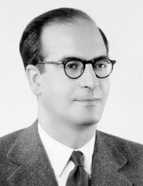

This historian and educator of great importance in the twentieth century came from a northern family background. His father, José Pinto de Macedo, an economist, professor, politician and journalist, came from a Douro family, with links to Vila Nova de Gaia and Resende. He was Secretary of the Partido Republicano Radical (Radical Republican Party) and supported greater autonomy for the overseas territories, particularly Angola. His mother, D. Maria da Conceição Borges de Macedo, came from a Trás os Montes family, around Macedo de Cavaleiros and Vale Benfeito, and, unlike her husband, was a devout Catholic, passing her faith on to her children. Jorge Borges de Macedo completed his secondary education at the Liceu Passos Manuel, in Lisbon. Amongst his teachers there he would later remember Dr Ângelo Ribeiro, who worked with Damião Pires on his História de Portugal. He entered the Faculty of Letters in Lisbon in the academic year 1939/40, distinguishing himself as a student, and being awarded a prize in the academic year 1942/43. He graduated in History and Philosophy in 1944, with a dissertation on “The Economic Situation at the Time of Pombal”, which was published in 1951.
From 1940 onwards he became known as a contributor to various periodicals, notably O Diabo, Seara Nova and Vértice. The lecture he gave on the topic of his dissertation at the French Institute in Portugal, on 17 March 1952, in which he presented the first findings of his studies on movements at the port of Lisbon at the time, reinforced his standing both nationally and internationally, and was well received by the likes of Veiga Simões, Jaime Cortesão, Vitorino Magalhães Godinho, Virgínia Rau, Earl Hamilton and Lucien Febvre. The text was later published in the Revista da História, in São Paulo.
After graduating, and while keeping up his activities in research and in specialist publishing, JBM taught at the Escola Machado de Castro, in Lisbon (1946-48), in the Escola Fonseca Benevides (1948-49), and was Professor of History and Philosophy at the Colégio Moderno, Lisbon (1949-53). He then joined the staff of the Portuguese Post Office, where he became an examiner (1953-57). However, he continued his historical researches on the port of Lisbon in the eighteenth century, and on society in the fifteenth and sixteenth centuries, as well as giving private classes in Philosophy, History and Portuguese, which he kept up for many years.
